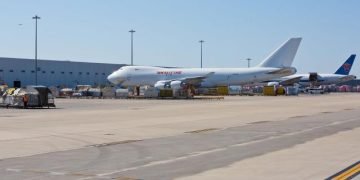The International Air Transport Association (IATA) projects a deceleration in air cargo demand growth for 2025, highlighting evolving market dynamics in the global logistics sector. While the industry remains resilient, key economic and operational factors are reshaping expectations.
Projected Highlights for 2025
- Volume Growth: Air cargo volumes are set to rise by 5.8%, reaching approximately 72.5 million tonnes. This marks steady growth but at a slower pace compared to the post-pandemic recovery boom.
- Revenue Forecast: Total air cargo revenue is predicted to reach $157 billion, contributing to 15.6% of overall airline revenue.
- Declining Yields: Average freight yields are expected to dip by 0.7%, reflecting stabilizing demand and competitive pricing pressures.
- Freight Rates: Forecasted at $1.34 per kilogram, representing a slight decrease from 2024.
Key Drivers of the Slowdown
- Economic Shifts
- Global inflation and slower GDP growth are affecting consumer spending and trade volumes, softening the demand for air freight services.
- E-commerce Normalization
- The rapid growth of e-commerce during the pandemic has now stabilized, leading to a plateau in express and time-sensitive shipments.
- Market Realignment
- Shifting trade patterns and geopolitical uncertainties are prompting businesses to adapt their supply chains, sometimes favoring alternative transportation modes.
Opportunities Amid Challenges
- Emerging Markets: Increasing trade activity in regions like Southeast Asia, Africa, and Latin America presents growth potential.
- Sustainability Investments: Airlines are accelerating efforts to adopt sustainable aviation fuels (SAF) and optimize routes, aligning with green logistics initiatives.
- Technological Advancements: The adoption of AI and digital tools for cargo management is improving operational efficiency and reducing costs.
Strategic Focus for 2025
To navigate the changing landscape, air cargo operators are focusing on:
- Cost Efficiency: Streamlining operations to maintain profitability in the face of yield declines.
- Flexibility: Enhancing capacity management to adapt to fluctuating demand.
- Innovation: Leveraging automation and predictive analytics to improve service offerings and customer satisfaction.
A Resilient Industry Adapts
The projected slowdown marks a shift towards stabilization for the air cargo sector. Despite challenges, the industry remains a vital player in global trade, demonstrating resilience and adaptability.
As logistics networks continue to evolve, air cargo stakeholders are poised to drive innovation and sustainability, ensuring their relevance in an increasingly competitive landscape.
Stay informed with The Logistic News for more insights on air cargo trends and industry updates.
ADVERTISEMENT























